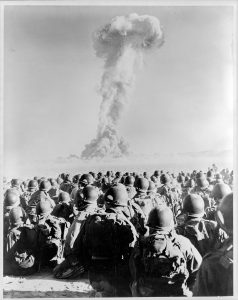I once wrote a great deal about nuclear weapons.
For more than two decades as a beat reporter at a daily newspaper in a state for which nuclear weapons was at times arguably the largest single business, it had a routine dailiness to it – what’s the budget for the new B61 mod 12? does that new gazillion dollar plutonium building make sense? – that masked the thing at its heart.

Nevada – Frenchman’s Flat – members of 11th AB Div. kneel on ground as they watch mushroom cloud of atomic bomb test – Courtesy Library of Congress
But in dealing with the very ordinariness of those things, the moral core was never far from the conversation. The thing that was both exhausting but also deeply gratifying was the ethical stance among of those involved. On one side were the weaponeers who believed that nuclear weapons, through deterrence, had become tools for peace. On the other side were people who believed nuclear weapons were an unspeakable evil. No, not unspeakable. We spoke about them a lot. But a deep and corrupting evil.
These views among the political disputants were irreconcilable, but sincerely and seriously held. I worked with the last generation of weaponeers who had felt the ground shake after a Nevada Test Site blast. They took their awesome (I use that word in its literal sense) responsibility seriously.
Ann Finkbeiner, like me a journalist who has lived at the margins of this world, was recalling today the words of the late Sid Drell, a physicist who advised governments for more than a half century of this stuff, and who was the very definition of someone taking it seriously:
Science is not a moral subject. You don’t know when you’re doing basic science where you’re going to end up. But the minute you get some idea and you can start thinking about the technical applications, that’s where societal questions come in. And having a [public] debate on these things, thinking these things through, that’s what I call the moral obligation of the community. And [being a science advisor to the government] gives you both an opportunity and a responsibility to speak out or to testify.
As Drell’s New York Times obituary explained, Drell in the last decade of his life became one of the leaders of a group seeking a path to the elimination of nuclear weapons:
In 2006, he and George P. Shultz, the secretary of state under Ronald Reagan, founded a program at the Hoover Institution to propose practical steps to rid the world of nuclear weapons.
“In dealing with terrorists or rogue governments, nuclear deterrence doesn’t mean anything — the value has gone,” he told the website In Menlo in 2012. “Yet the danger of the material getting into evil hands has gone up. So what are existing nuclear arms deterring now? In this era, I argue that nuclear weapons are irrelevant as a deterrence.”
There are those opposed to nuclear weapons who argued Drell, Schultz, and the other advocates of this approach to our nuclear future of providing cover for the status quo. I never felt competent to come to my own judgment regarding the answer to that question, but I appreciated the deep moral seriousness and sincerity of those engaged in the fierce debates.
It is in this context that I share my horror at the flip way the incoming Trump administration is dealing with U.S. nuclear weapons policy – tweet, confused explanation from spokespeople, strange new comments from the president-elect. (The Washington Post’s Philip Bump chronicled the whole affair if you want details.)
I get that elections have consequences, and that the incoming administration might pursue policies with which I disagree on a host of issues. But on all questions – especially on this one, where the risk is literally annihilation of billions of people on a time scale of hours – I expect seriousness of the sort the late Sid Drell brought to the task.

Pingback: The Last Word On Nothing | Sid Drell, 1926 – 2016, Whom We Still Needed
Pingback: Sid Drell, 1926 – 2016, Whom We Still Needed - Top 10 RSS Feeds | Follow the Most Popular RSS Feeds
Nice article.
If nuclear weapons are not a deterrence currently, what are they for and why spend billions of dollars a year for a product that has no use?